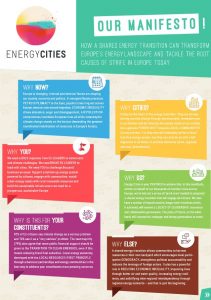European Investment Bank vows to divest from fossil fuels
New draft energy lending policy might turn the EIB into EU's first climate bank by end of 2020
In its draft describing the new energy lending policy published today, the European Investment Bank takes a big step for climate action. The bank foresees to withdraw its support to fossil fuel projects by the end of 2020. Energy Cities welcomes this bold commitment and calls on the EU Member States to back this ambitious proposal.
The European Investment Bank’s (EIB) new policy would bring funding for fossil fuel projects to a halt, both in the EU as well as outside of the Union. This critical shift would align the bank’s investments with the objectives of the Paris Agreement and bring the EU on a net-zero emission pathway by 2050. Being the world’s largest multilateral lender, the EIB’s move will also set an example for other public banks to follow.
By divesting from fossil fuels, the EIB vows to no longer “support upstream oil or gas production, coal mining, infrastructure dedicated to coal, oil and natural gas (networks, liquefied natural gas terminals, storage) and power generation or heat production from fossil fuel sources (coal, gas, oil, peat)”. This exclusion of fossil fuels investments would apply to all operations of the bank. It covers not only direct investment
Support for “low-carbon gases” and nuclear still possible
Under its new energy lending policy, the bank would still support “the production of low-carbon gases including hydrogen, biogas, and synthetic
EU Member States must now back EIB’s divestment proposal
Energy Cities has been tirelessly advocating for the EU’s public bank to divest from fossil fuels. Our network has been putting pressure notably through the joint “Fossil Free EIB” campaign with NGOs across Europe, the EU elections 2019 manifesto and the response to the EIB’s public consultation prior to the draft. Now, the bank has put forward a robust proposal to practically end its support to fossil fuels and focus its resources on supporting a Paris-proof energy transition. This may turn it into the EU’s first climate bank, which the incoming EU Commission President Ursula von der Leyen had vowed to do upon her appointment. EU Member States must now endorse this key step forward in tackling climate change. Will they approve the new draft energy lending policy in the EIB Board of Directors in autumn?
Once the EIB’s final energy lending policy is approved, Energy Cities will share its detailed analysis

